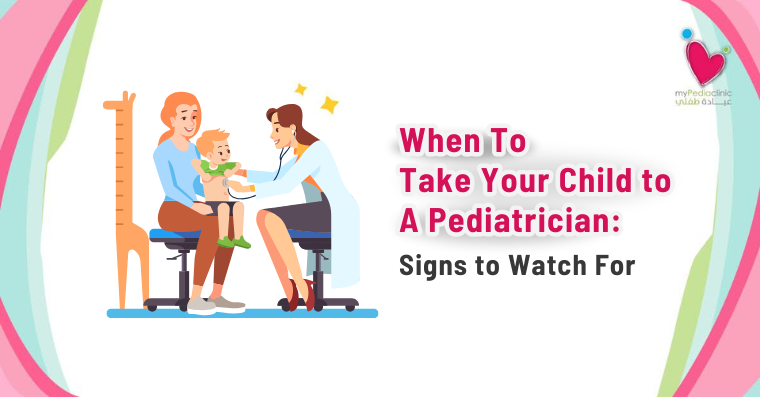When to Take Your Child to a Pediatrician in Dubai: Warning Signs Every Parent Should Know
As a parent, knowing when your child’s symptoms require professional medical attention versus home care can be challenging. Children experience various health issues—from minor sniffles to serious illnesses—and distinguishing between them isn’t always straightforward. While you don’t want to rush to the doctor for every cough, you also don’t want to delay care when it’s truly needed.
Understanding the warning signs that indicate it’s time to consult a pediatrician in Dubai helps ensure your child receives appropriate care while alleviating unnecessary worry. At myPediaClinic Dubai, we empower parents with the knowledge they need to make informed decisions about their child’s health.
Emergency Signs Requiring Immediate Medical Attention
Some symptoms require immediate medical care. If your child experiences any of the following, seek emergency attention or contact your pediatrician right away:
- Difficulty breathing or blue tint around lips or face
- Loss of consciousness or unresponsiveness
- Severe head injury with vomiting, confusion, or loss of consciousness
- Seizures (especially first-time seizures)
- Severe allergic reaction with swelling, difficulty breathing, or rapid onset of symptoms
- Uncontrolled bleeding
- Suspected broken bones or severe injuries
- Ingestion of poisonous substances or medications
- Severe dehydration with no urination for 8+ hours
- Severe abdominal pain
Common Warning Signs That Need Pediatric Evaluation
1. Persistent or High Fever
Fever is the body’s natural response to infection and isn’t inherently dangerous. However, certain fever patterns require medical evaluation:
When to Contact a Pediatrician About Fever:
- Infants under 3 months: Any fever of 100.4°F (38°C) or higher requires immediate medical attention
- Ages 3-6 months: Fever of 102°F (39°C) or higher
- Any age: Fever lasting more than 3 days
- Any age: Fever of 104°F (40°C) or higher
- Accompanying symptoms: Fever with severe headache, stiff neck, confusion, difficulty breathing, or rash
- Behavior changes: Fever with lethargy, irritability, or unusual drowsiness
In Dubai’s climate, dehydration can compound fever symptoms, making professional evaluation even more important.
2. Difficulty Breathing
Respiratory distress requires prompt medical attention. Contact your pediatrician immediately if your child shows signs of breathing difficulty:
- Rapid breathing (faster than normal for their age)
- Labored breathing with chest retractions (skin pulling in between ribs)
- Wheezing or whistling sounds when breathing
- Persistent coughing, especially if worsening
- Grunting noises with breathing
- Flared nostrils with each breath
- Blue or pale color around lips, face, or fingernails
- Inability to speak full sentences due to breathlessness
These symptoms could indicate asthma, pneumonia, bronchiolitis, or allergic reactions requiring immediate treatment.
3. Severe or Persistent Vomiting and Diarrhea
While occasional stomach upset is common in children, severe cases warrant medical attention:
When to Contact a Pediatrician:
- Vomiting or diarrhea lasting more than 24 hours in infants
- Vomiting or diarrhea lasting more than 2-3 days in older children
- Blood in vomit or stool
- Signs of dehydration: dry mouth, no tears when crying, no urination for 8+ hours, sunken eyes, lethargy
- Severe abdominal pain accompanying vomiting
- Inability to keep down any fluids
- Vomiting following a head injury
Dehydration develops quickly in Dubai’s heat, especially in young children, making prompt medical evaluation crucial.
4. Unusual Rashes or Skin Changes
While many childhood rashes are harmless, certain patterns require medical evaluation:
Contact Your Pediatrician If:
- Rash spreads rapidly
- Rash accompanied by fever
- Rash appears bruised or doesn’t blanch (fade) when pressed
- Blisters, oozing, or signs of infection
- Severe itching causing distress
- Rash with swelling, especially around face or throat
- Rash following new medication
- Hives with difficulty breathing
Rashes can indicate allergic reactions, infections, or other conditions requiring specific treatment.
5. Significant Behavioral Changes
Parents often sense when something isn’t right with their child. Trust your instincts if you notice:
- Unusual lethargy or difficulty waking
- Excessive irritability or inconsolable crying
- Confusion or disorientation
- Sudden changes in appetite lasting several days
- Loss of interest in favorite activities
- Regression in developmental milestones
- Persistent school performance decline
- Behavioral changes following illness or injury
These changes could signal illness, pain, emotional distress, or developmental concerns requiring professional assessment.
6. Ear Pain
Ear infections are common in children and cause significant discomfort. Schedule a pediatric visit if your child:
- Complains of ear pain
- Pulls or tugs at ears repeatedly (especially infants)
- Has fluid draining from ears
- Has hearing difficulties
- Shows increased fussiness or crying, especially when lying down
- Has fever with ear symptoms
Untreated ear infections can lead to hearing problems or more serious complications. Early intervention provides relief and prevents complications.
7. Injuries Requiring Professional Evaluation
Active children inevitably experience bumps and bruises, but certain injuries require medical attention:
Suspected Fractures:
- Visible deformity in limb
- Inability to move or bear weight on injured area
- Severe swelling or bruising
- Severe pain that doesn’t improve
Head Injuries:
- Loss of consciousness (even briefly)
- Vomiting after head injury
- Severe headache
- Confusion or memory problems
- Unequal pupil sizes
- Clear fluid from nose or ears
Cuts and Lacerations:
- Deep cuts that won’t stop bleeding after 10 minutes of pressure
- Cuts with visible fat or muscle tissue
- Wounds with jagged edges that may need stitches
- Cuts on face requiring cosmetic consideration
- Any bite wounds (animal or human)
Routine Check-Ups and Preventive Care
Beyond addressing illnesses and injuries, regular well-child visits are essential for monitoring growth, development, and overall health.
Recommended Well-Child Visit Schedule:
Infants (First Year):
- 1 month
- 2 months
- 4 months
- 6 months
- 9 months
- 12 months
Toddlers:
- 15 months
- 18 months
- 24 months (2 years)
Ages 3-21:
- Annual checkups
What Happens During Well-Child Visits:
- Growth monitoring: Height, weight, and head circumference tracking
- Developmental screening: Assessing age-appropriate milestones
- Physical examination: Complete health assessment
- Vaccinations: Following UAE immunization schedule
- Vision and hearing screening: Detecting issues early
- Health education: Guidance on nutrition, safety, and development
- Parent questions: Opportunity to discuss any concerns
These appointments allow pediatricians to detect potential health issues before they become serious problems, ensuring optimal growth and development.
When to Trust Your Parental Instincts
Sometimes symptoms don’t fit neat categories, but you sense something is wrong. Parents know their children better than anyone. If your child doesn’t seem “right” to you—even if you can’t pinpoint why—it’s appropriate to consult your pediatrician.
Trust your instincts when:
- Your child is acting unusually for them
- You feel worried despite symptoms seeming minor
- Symptoms persist despite home treatment
- Multiple mild symptoms occur together
- Your child seems sicker than their symptoms suggest
Pediatricians would rather evaluate a child who turns out to be fine than miss a serious condition because parents hesitated to call.
Special Considerations for Dubai Families
Heat-Related Illness
Dubai’s extreme temperatures increase risks of heat exhaustion and heatstroke. Watch for excessive sweating, weakness, dizziness, nausea, or confusion, especially after outdoor activities.
Dehydration
The climate makes dehydration more likely. Ensure children drink adequate water, especially during illness or after physical activity.
Respiratory Issues
Dust, sand, and rapid transitions between extreme heat and air conditioning can trigger respiratory problems. Monitor children with asthma closely.
How to Prepare for Your Pediatrician Visit
Make the most of your appointment by being prepared:
- Write down symptoms, including when they started and their progression
- Note any medications or home treatments tried
- Record fever temperatures and when they occurred
- Bring your child’s health records and vaccination card
- List any questions or concerns
- Bring your insurance information
Why Choose myPediaClinic for Your Child’s Healthcare
At myPediaClinic Dubai, we provide comprehensive, compassionate pediatric care for children from birth through adolescence:
- Experienced pediatricians: Board-certified with extensive training
- Comprehensive care: From routine checkups to specialized treatment
- Same-day appointments: Available for urgent concerns
- Multilingual staff: Communication in your preferred language
- Child-friendly environment: Designed to reduce medical anxiety
- Insurance accepted: Working with major health insurance providers
- Convenient location: Easy access for Dubai families
Your Child’s Health Is Our Priority
Being attentive to your child’s health and recognizing warning signs ensures they receive appropriate care when needed. Whether you need a routine wellness exam, have concerns about symptoms, or require urgent evaluation, our team is here to support you.
Don’t hesitate to reach out if you’re worried about your child’s health. Contact myPediaClinic Dubai today to schedule an appointment or discuss your concerns with our experienced pediatric team.
Frequently Asked Questions About Pediatric Care
Should I take my child to the pediatrician for every fever?
Not every fever requires a doctor visit. However, seek medical attention for infants under 3 months with any fever (100.4°F/38°C or higher), fever lasting more than 3 days at any age, fever above 104°F (40°C), or fever accompanied by other concerning symptoms like difficulty breathing, severe headache, or lethargy.
How can I tell if my child’s symptoms are serious?
Trust your parental instincts. Seek immediate care for difficulty breathing, blue-tinged skin, unresponsiveness, severe injuries, or signs of severe dehydration. Contact your pediatrician if symptoms persist despite home care, worsen over time, or if your child seems unusually ill to you.
How often should my child have checkups?
Infants need frequent checkups (at 1, 2, 4, 6, 9, and 12 months). Toddlers visit at 15, 18, and 24 months. After age 2, annual checkups are recommended through age 21. These visits monitor growth, development, and ensure vaccinations are up to date.
Can I call my pediatrician with questions without making an appointment?
Yes, most pediatric practices, including myPediaClinic, welcome phone calls about health concerns. Our team can help you determine if your child needs to be seen or if home care is appropriate. Don’t hesitate to call if you’re worried.
What should I do if my child gets sick outside regular office hours?
For emergencies, go to the nearest emergency room or call emergency services. For urgent but non-emergency concerns, check if your pediatric clinic offers after-hours phone consultation. Many practices have on-call providers who can assess symptoms and provide guidance.





